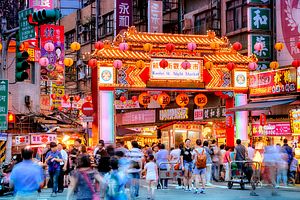While a great deal of attention is being paid to the effects of increasing multiculturalism in South Korea and Japan, a close neighbor has been overlooked as a society also in the midst of this phenomenon: Taiwan.
As Taiwan has liberalized and opened, it has become a more attractive place for foreigners to visit, live, and invest. As such, Taiwan is gradually emerging as a multicultural society. But it is clear that in order to compete with its bigger, more popular neighbors in the region, Taiwan will require a larger immigrant population.
Taiwan’s economy is stable, but not impressive. A more open immigration policy is integral to revolutionizing Taiwan’s manufacturing and export-oriented economy. It would also address the glaring economic and social problems associated with Taiwan’s aging population and its status as possessing one of the world’s lowest fertility rates.
The Taiwanese government could address these challenges by better attracting and keeping foreigners on its shores. One of the biggest problems facing Taipei in this area is working out how best to entice foreign students and professionals already studying or working in Taiwan to stay and contribute to society.
Foreign students have recently been given a six month visa extension to look for work after graduation. The same has been granted to foreign professionals wanting to change employment. These types of changes are crucial if Taiwan wants to attract and retain international talent.
Migration trends over the past two decades have seen an impressive increase in the number of foreign permanent residents in Taiwan from 1,649 in 2005 to 10,811 at the end of 2014 (excluding residents from mainland China). In 2014, for the first time, the number of first and second-generation immigrants living in Taiwan exceeded the population of Taiwan’s indigenous peoples.
Two of the biggest factors leading to the recent increase in immigration to Taiwan include the creation of permanent residence in 1999 and the relaxation of rules applying to the financial, health, and criminal records of immigrants. Some of the largest groups of foreign residents now living in Taiwan include Indonesian, Vietnamese, Japanese, and American-born nationals.
At the end of 2014, important draft amendments to the Nationality Act were announced. Under the proposed reforms, foreigners applying for Republic of China (ROC) citizenship will not have to renounce their original citizenship. These changes would mean that foreigners could be dual-nationals.
This is a very important step in the right direction. But Taiwan faces large challenges as it grows into a more cosmopolitan society.
Taiwan’s past immigration policies have reflected a perception that Taiwan is essentially a mono-cultural society based on a narrow shared ethnicity and culture. Public and political discourse on multiculturalism has solely focused on the indigenous population, Chinese mainlanders, the Hokkien and the Hakka people. Combined with Taiwan’s isolated political situation, this has not aided Taiwan in becoming more open, competitive, and vibrant.
One of the most common questions asked of foreign students in Taiwan today is “Why did you choose to study in Taiwan over China?” Questions such as these exhibit the lack of international self-awareness that still plagues the Taiwanese people. Taipei’s new Mayor, Ko Wen-je recently accurately described this situation, suggesting, “Taiwan is like a car with very powerful engines but no steering wheel.”
In addition to this, Taiwanese people themselves have little experience with international travel outside the narrow confines of East Asia. Travel data collected by the Taiwanese Tourism Bureau confirmed that the Taiwanese still prefer to visit countries very close by, with 88 percent of international travel in 2013 being to Asian countries, primarily China (32 percent) and Japan (26 percent).
Despite these challenges, the cultural landscape in Taiwan is changing and this shift has also been reflected in the media. Until recently, foreigners were largely excluded from representation in Taiwanese media, but now they are increasingly being featured in films, television dramas, and documentaries. Films such as Homesick Eye illustrate the hardships faced by Southeast Asian migrant workers in Taiwan. My Imported Wife is a documentary about the victimization of immigrant wives and the issues that come along with transnational marriage. These creative representations are an interesting reflection of the changing cultural dynamic in Taiwan and point to a trend toward an increasing acceptance of multiculturalism.
While Taiwan’s immigration policy has come a long way in recent years, there is still much that could be done to open the society up. The first step is making sure immigration policy doesn’t restrict or dissuade talented foreigners from living and working in the country.
Sinclaire Prowse is a CSIS Non Resident Handa Fellow. She holds a Master of United States Studies from Sydney University, Australia.

































